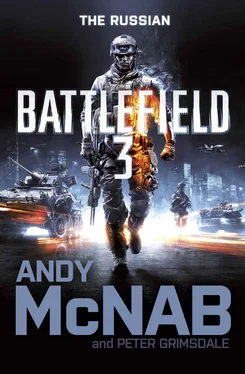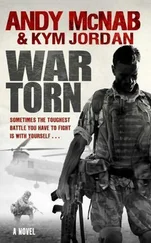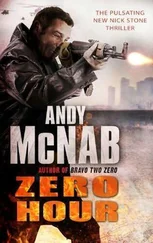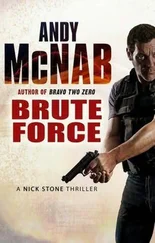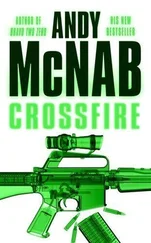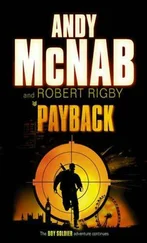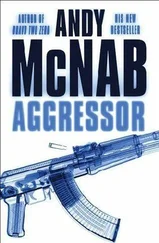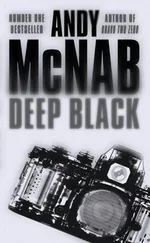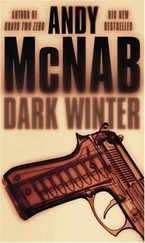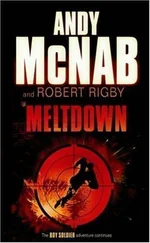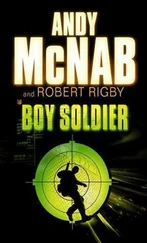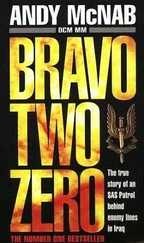He strode forward and smoothed his hands over the fuselage as if it were the flanks of a prize racehorse. ‘Feel.’
Dima felt.
‘Special paint to suppress infrared detection. First time we’ve used it.’
Dima pointed at the Nuke team’s Mil-24. ‘And that?’
Burdukovsky shrugged, the first sign of a chink in his armour of enthusiasm.
‘Standard issue, so keep them back till you’ve secured the site.’
Dima walked over to the other aircraft. Shenk, the Nuclear Recovery team leader, was doing final checks on radiation gear with his crew. When he saw Dima he stopped and stood with his arms folded as if barring the way. He had a long tombstone of a face, more suited to an undertaker. If there was a Mrs Shenk he felt sorry for her.
‘Something you need?’ He jutted his chin out.
Dima suppressed a desire to give it a good whack.
He tried a warm smile.
‘Came to wish you good luck.’
‘You do your bit right, we won’t need luck.’
The rest of the crew stopped what they were doing.
Dima pressed on. ‘I need pictures of the device I can show the team. They need to know what they’re looking for.’
Shenk shook his head slowly and deliberately.
‘Classified.’
‘Ha ha, very funny.’
Shenk jutted his chin. ‘Very serious. All pictures, diagrams and descriptions are only for those cleared by the Defence Secretary himself. You secure the area and find your target. We do the rest.’
Dima walked over to the kit laid out in the hold of the chopper. Geiger counters, wouldn’t want to go in without those. And a slim tablet-style PC: bit odd. He decided to find out if there was any more to it, like a scanner.
He picked it up, turned it over and scrutinised it doubtfully. Shenk grabbed it out of his hand.
‘Only for those authorised, I’m afraid. Extremely delicate.’
Dima picked it up again, peering slightly as his grandmother might, confronted with the same object.
‘It doesn’t look much.’
‘Look,’ said Shenk, taking it back again. ‘This begins by being used as a normal sat nav to give directions, but it’s been customised to pick up the signal from the devices. It will then pinpoint the suitcases by giving the longitude and latitudes of their positions to within less than half a square mile, from a distance of up to 400 miles. This information is then converted when this tab is touched, and this point on the appropriate menu here, to a grid reference that can be used on the map. It’s more accurate than a scanner and thus ten times more out of bounds to the likes of you.’
Dima changed his expression to look guilty, and memorised the instructions to tell Kroll when the moment came.
‘Now if you’ll excuse me,’ said Shenk, ‘I have to prepare for this mission.’
‘Yes, of course. Sorry’
Dima watched for a bit longer as Shenk and his team fiddled with their kit. Russia bred them in their thousands. Men who spent most of their waking hours in a state of ingrained dissatisfaction, who thought they deserved better but never actually went for better, who spent their lives furiously guarding their precious bit of territory. The Russian military was full of them. Shenk’s life was about dealing with the mistakes of others, the cock-ups, the negligence, whether it was the fallout from Chernobyl or the countless warheads well past their sell-by date, seeping radiation. Russia needed its share of Shenks. So much of Russia’s nuclear arsenal was older than anyone liked to admit, incapable of being used in anger if it came to it. But in the mad world of Mutually Assured Destruction, it was the nations with the nukes who got to sit at the top tables. This was the root of Shenk’s self importance, saving the world from its own folly. Clearly he thought he should be running this show, not Dima.
‘See you at the LZ. I’ll get it all nicely prepared for you.’ Dima gave him a cheery salute and walked away. But something still told him it wasn’t going to be as simple as that.
13
Azerbaijan Airspace
The Mil Mi-26 lumbered upwards, curving away from the base as its rotors clawed the air, battering Dima’s ears with its thunderous throb. The temperature in the hold plummeted. Under their flight suits, Dima’s advance crew were already in their Iranian kit. Dropping them had to be executed with maximum speed. The landing zone they had chosen was a scrap of land surrounded by forest, fifteen kilometres from the compound, but a forty-five minute drive on the unmetalled roads threaded along the steep valley sides. It was good cover, but the sooner the Peykans were unloaded and separated from the Mil, the less danger of the cars being in any way connected to the fat black Russian chopper.
Kroll and Vladimir had taken refuge from the cold inside one of the Peykans. Vladimir was fast asleep after his first good meal in two years, his face a better colour, though the scar on his cheek still stood out. Kroll stared straight ahead, stonily. Helicopters were his bête noir . He had survived two hard landings and had made a lucky escape from a third when it had ditched in the Caspian.
Either side of the cars was the Go Team, to be deployed when Dima called them in. Until then they would remain on standby at an Azerbaijani airstrip just across the border. They were in full assault kit, everything black, and they carried AKSUs — short versions of the AK47, fitted with thermal imaging sights that were essential for seeing through smoke or CS gas. The AKSUs were also easier to conceal. With the stock folded they measured less than fifty centimetres. Some would also be packing PMMs or 6P35 Grach pistols. Saiga-12 shotguns would be handy for taking down doors and KS-23s armed with CS gas would help along the process of room clearing. Despite the volume of intelligence, they still had no real idea of how much opposition they would meet.
For some of these men, recent graduates, this would be their first hostile deployment. Dima felt a strong sense of responsibility for taking them on this escapade. I must be getting old, he thought. For a long time now he had worked alone, or just with Kroll. He used to have a reputation as a good leader, the sortmen would follow to hell and back — and quite often not back at all. But that was when he was a paid-up Spetsnaz. Now he was a freelance, a gun for hire. He’d heard Kroll say, ‘You never leave Spetsnaz — even if they fire you. Even if they put you in jail.’ Surely a few of these young men had to be asking themselves why they were putting their trust in a man who apparently had no allegiances, whose own masters had long been suspicious of him. But then he thought back to his own early days — when he was desperate for an assignment, any assignment. That was the point of Spetsnaz, to expect the unexpected.
Suddenly he realised that many of them would be the same age as the young man in Paliov’s photographs. He tried to put them out of his mind and concentrate on the job in hand. If he couldn’t focus, he would never get them and it would all have been for nothing. He had to separate himself from all emotions, completely.
He checked through the kit in each of the Peykans’ trunks. The same array of armour. In addition, five SVD Dragunovs — not the most accurate sniper gun but with the ten-round magazine and a 4x scope it was fine for the relatively close range work he anticipated. He’d demanded every kind of night vision optics — binoculars for the recce, goggles for close action. He planned on getting a firsthand view inside the compound walls before calling in the Go Team. That meant a rope kit for climbing and — when they were ready — rappelling. Whatever they had, there would be something they had missed. It was the nature of these operations, balancing enough kit with the need to be nimble.
Читать дальше
